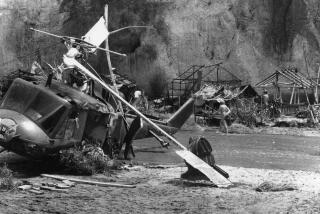‘Twilight’ Trial Slowed by Debate Over Statements
- Share via
LOS ANGELES — The “Twilight Zone” involuntary manslaughter trial, already in its fifth month of testimony, has bogged down further as attorneys engage in a painstaking debate on whether potentially damaging statements made by the five defendants can be presented to the jury.
At stake in the debate, which began last week and is due to continue today, is the admissibility of hundreds of pages of interviews given by director John Landis and his four co-defendants to the Los Angeles County Sheriff’s Department and the National Transportation Safety Board. The defendants are charged with negligence in the 1982 deaths of actor Vic Morrow and two child actors in a film set helicopter accident.
Deputy Dist. Atty. Lea Purwin D’Agostino says the statements contain “a lot of damaging stuff (without which) the jury will not get the true picture of what happened.” But defense attorneys contend that their clients’ rights will be prejudiced if the statements are allowed into evidence.
At the heart of the debate is a 1965 state Supreme Court ruling, People vs. Aranda, that holds that in cases where two or more defendants are tried jointly, statements made by one defendant cannot be presented verbatim if they are damaging to another.
For example, admissions made by helicopter pilot Dorcey Wingo could not be introduced as evidence against Wingo if they also served to implicate Landis or the three other defendants. The reason for the rule is that if Wingo later refused to take the witness stand, as is his right, then the lawyers for the other defendants could not avail themselves of the constitutional right of directly challenging the evidence by cross-examining Wingo.
The Aranda ruling came into play over an interview between Wingo and authorities held hours after the accident. In it, the pilot said he never knew exactly where special-effects explosives had been placed on the set.
D’Agostino contends that Wingo’s admission is significant in light of recent testimony by an expert witness that helicopter pilots should always be aware of the exact location of explosives before undertaking a special-effects filming sequence. A fireball from one of the explosives on the “Twilight Zone” set struck the helicopter in the fatal sequence, resulting in the crash that killed the three on the ground.
While D’Agostino sought to have Wingo’s statement presented to the jury, attorneys for the defendants countered that it would prejudice their clients. Each piece of evidence in the case bears on all of the defendants, said Harland Braun, who represents associate producer George Folsey Jr.
Wingo’s attorney, Eugene L. Trope, contended that it would be unfair to his client if the jury heard only selected portions of his interview.
Los Angeles Superior Court Judge Roger W. Boren made no immediate ruling but did indicate that eventually he will probably exclude major portions of statements by all the defendants.
Boren can admit or reject any of the statements or can instead order that they be “cleaned up” by taking out references to the other defendants.
Another key statement that D’Agostino is expected to introduce is Landis’ reply to investigators when he was asked whether the helicopter was positioned in the same place during the fatal scene as it was during a rehearsal.
Said Landis: “Basically. It wasn’t exactly where it was going to be, but I figured that I didn’t care. . . .”
One of the few things that both D’Agostino and the defense agree on is that if they continue to pore over the statements line by line, the Aranda rulings could take several days, or weeks, to conclude.
Surprisingly, after Aranda was first raised by the defense last week, D’Agostino acknowledged outside court that the key issue had slipped her mind.
“I forgot about Aranda, can you believe that?” D’Agostino told reporters.
Defense attorneys quickly pounced upon the prosecutor.
“If she claims she doesn’t know (about Aranda), she has the IQ of a radish,” asserted Arnold L. Klein, Stewart’s attorney, outside of court. Klein added that the issue would not have emerged if the defendants had been tried separately, an idea the district attorney’s office resisted because it would have further dragged out the case.
The “Twilight Zone” trial has already well exceeded its estimated four-month length, with the prosecution thus far calling 64 witnesses to the stand. D’Agostino has predicted that she will conclude her case in early February, when the defense will begin calling its witnesses.
More to Read
Sign up for Essential California
The most important California stories and recommendations in your inbox every morning.
You may occasionally receive promotional content from the Los Angeles Times.









